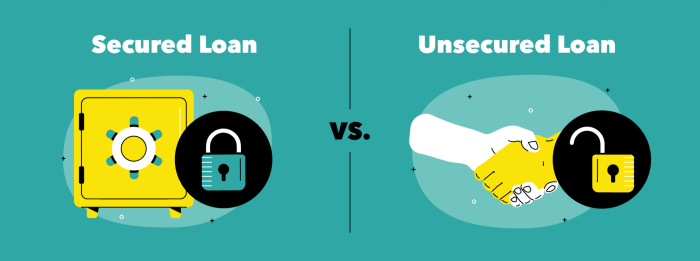Secured vs. unsecured loans sets the stage for this enthralling narrative, offering readers a glimpse into a story that is rich in detail and brimming with originality from the outset. As we delve into the world of loans, we will explore the nuances between secured and unsecured options, shedding light on their intricacies and implications for borrowers.
As we navigate through the intricacies of secured and unsecured loans, we aim to provide a comprehensive understanding of how these financial instruments shape borrowing decisions and financial outcomes.
Secured Loans
Secured loans are loans that require collateral to secure the lender’s investment and reduce the risk of default for the borrower. This collateral serves as a guarantee that the borrower will repay the loan in full and on time. If the borrower fails to repay the loan, the lender has the right to seize the collateral to recoup their losses.
Types of Collateral for Secured Loans
- Real estate: Properties such as homes, land, or commercial buildings can be used as collateral for secured loans.
- Automobiles: Vehicles can also serve as collateral for loans, especially in the case of auto loans.
- Investments: Stocks, bonds, or other investment accounts can be pledged as collateral for certain types of loans.
- Jewelry and valuable assets: Precious metals, gemstones, or other valuable items can be used as collateral for secured loans.
Advantages and Disadvantages of Secured Loans
- Advantages:
- Lower interest rates: Secured loans typically come with lower interest rates compared to unsecured loans due to the reduced risk for the lender.
- Higher borrowing limits: Because of the collateral provided, borrowers can usually access higher loan amounts with secured loans.
- Improved approval chances: Individuals with lower credit scores or limited credit history may have an easier time getting approved for a secured loan.
- Disadvantages:
- Risk of losing collateral: If the borrower defaults on the loan, they risk losing the collateral they provided to secure the loan.
- Longer approval process: Secured loans may take longer to approve and fund due to the evaluation of the collateral’s value and authenticity.
- Impact on credit score: Defaulting on a secured loan can have a severe negative impact on the borrower’s credit score and financial stability.
Unsecured Loans
Unsecured loans are loans that are not backed by collateral. Unlike secured loans, unsecured loans are approved based on the borrower’s creditworthiness and ability to repay the loan, rather than any asset or property that can be repossessed by the lender in case of default.
Types of Unsecured Loans
- Personal Loans: These are general purpose loans that can be used for various personal expenses such as home renovations, medical bills, or debt consolidation.
- Credit Cards: Credit cards are a form of unsecured credit that allows consumers to borrow funds up to a certain limit and repay them at a later date.
- Student Loans: Student loans are unsecured loans designed to help students cover the cost of their education and are typically offered at lower interest rates compared to other unsecured loans.
- Unsecured Business Loans: These loans are provided to businesses without requiring any collateral and can be used for various business purposes such as expansion, inventory purchase, or working capital.
Interest Rates Comparison
Unsecured loans generally have higher interest rates compared to secured loans. This is because lenders take on more risk when providing unsecured loans since there is no collateral to secure the loan. As a result, borrowers with lower credit scores may face even higher interest rates on unsecured loans to compensate for the increased risk to the lender.
Collateral
When securing a loan, collateral plays a crucial role in providing lenders with a sense of security. Collateral serves as a form of protection for the lender in case the borrower defaults on the loan. It offers a way for lenders to recoup some or all of their losses if the borrower fails to repay the loan according to the agreed terms.
Examples of Valuable Assets as Collateral
- Real estate properties such as homes, land, or commercial buildings
- Automobiles or other vehicles
- Investment accounts or securities
- Jewelry, valuable collectibles, or antiques
Risks Associated with Using Collateral for a Loan
While collateral provides a level of security for lenders, it also poses risks for borrowers. If the borrower defaults on the loan, they risk losing the collateral pledged to secure the loan. This could result in the loss of valuable assets that hold significant personal or financial value.
Additionally, if the value of the collateral decreases over time, borrowers may face challenges in securing future loans or obtaining favorable lending terms. It is essential for borrowers to carefully consider the risks associated with using collateral before taking out a secured loan.
Eligibility Criteria

Secured loans typically require collateral, such as a home or vehicle, to secure the loan. This collateral acts as a guarantee for the lender that they will recoup their funds if the borrower defaults on the loan. Additionally, secured loans may have lower interest rates compared to unsecured loans due to the reduced risk for the lender.
Typical Requirements for Obtaining a Secured Loan
- Collateral such as a house, car, or other valuable asset
- Good credit history
- Stable income to ensure repayment
Comparison of Eligibility Criteria for Secured and Unsecured Loans
When comparing secured and unsecured loans, the eligibility criteria for unsecured loans are typically less stringent. Unsecured loans do not require collateral, but they often come with higher interest rates and lower borrowing limits.
Impact of Credit Scores on Eligibility
- For secured loans, a good credit score can help secure better terms and interest rates.
- For unsecured loans, credit scores play a significant role in determining eligibility and interest rates.
- A higher credit score generally increases the chances of approval and lower interest rates for both types of loans.
